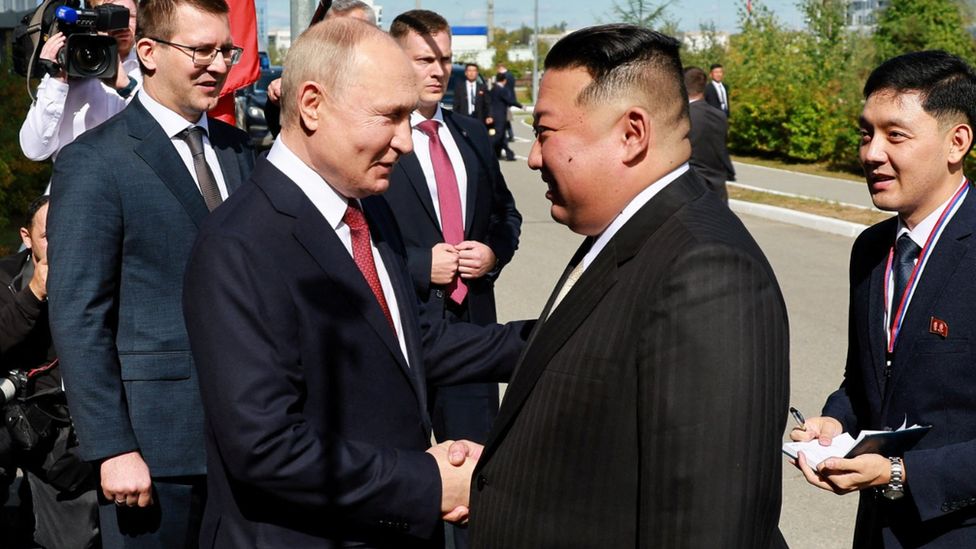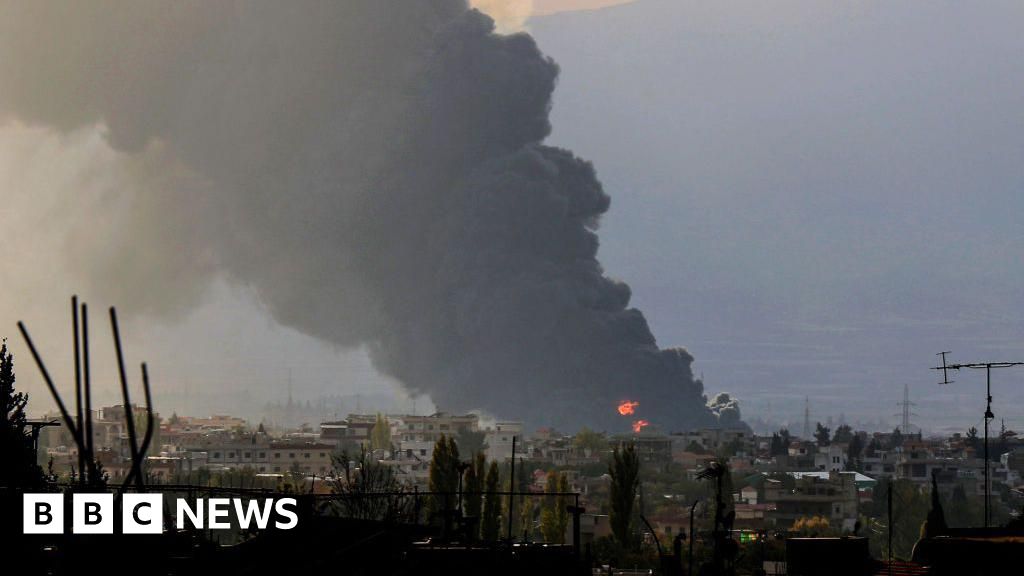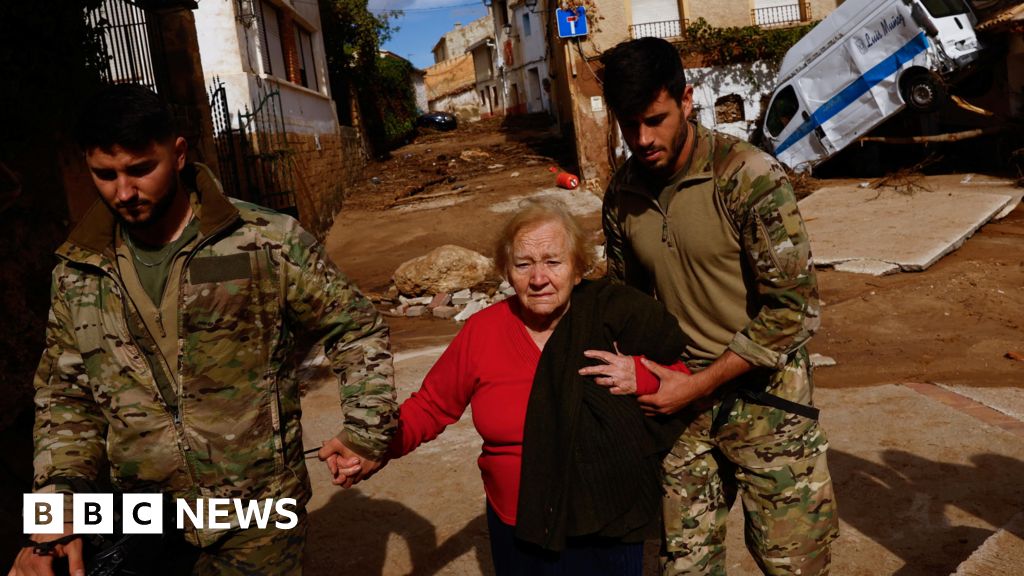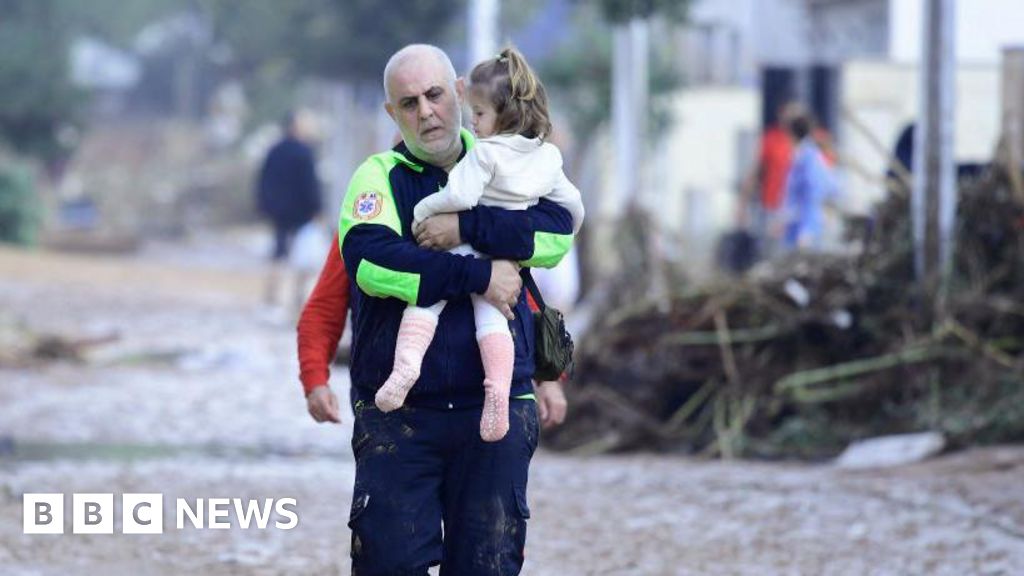ARTICLE AD BOX
 Image source, Reuters
Image source, Reuters
President Putin (left) and Kim Jong Un last met four years ago - in very different times
They strolled side by side through the gleaming space centre - their aides behind them falling in step.
Standing over a launchpad, they gazed into the pit from where rockets blast into space.
And over a banquet later that day, they drank red wine and toasted the embrace of their two pariah states.
The optics of Kim Jong Un and Vladimir Putin's date in Russia's far east have been flashy to say the least. And it isn't over yet with the North Korean leader spending several days touring shipyards, aircraft factories and other military sites before he returns home.
There had been great anticipation in the lead-up - with global media rapt as Kim trundled for hours in his armoured train over the border.
He kept the West guessing for nearly 40 hours before reaching the Vostochny Cosmodrome - a space base in a far-flung eastern corner of Russia. Even then, it was unclear what exactly the pair would be meeting to talk about - with White House warnings that the North could sell arms to Russia sparking alarm last week.
Putin had sent ahead a welcome party to greet Kim as his train rolled onto the space base's tracks. A red-carpeted, balustrade staircase was also erected mid-air, waiting for the train to pull in and for the North Korean leader to step out.
Image source, KCNA
Image caption,Kim - who rarely flies because of security concerns - travelled nearly 40 hours on his luxury train to meet Putin
Putin was waiting in front of the centre when Kim drew up in his limousine. There, before flashing cameras, the two leaders shook hands - the pictures beamed out immediately by state media.
Both leaders know the power of showmanship, but the Supreme Leader of North Korea, as Kim is known, is in particular known for his ceremony. He is third in a dynasty of supreme leaders "who have generations of mythology constructed around them", says Sarah Son, a North Korea expert at the University of Sheffield.
"It wouldn't do to be seen as a run-of-the-mill, limited term state leader by domestic audiences, who will be seeing this journey and parts of the meetings on television and in the newspaper.
"It's very important for Kim to have one-to-one meetings with leaders of other countries so that all eyes are on him, making North Korea appear as a more significant global player than it actually is.
"Sanctions of course remain extremely tight and Russia's need for arms presents an opportunity to achieve two complementary aims: income for the North Korean state and evidence that Kim is worthy of the attention of the leader of a major global power."
About an hour before the two leaders met, Pyongyang had also fired off two ballistic missiles - the first launched without the leader at home.
"The summit defiantly linked pariah state behaviour in Europe and Asia," says Leif-Eric Easly, a professor at Ewha University in Seoul.
Image source, KREMLIN/REUTERS
Image caption,Putin waiting to greet Kim outside the space centre
But beyond the spectacle and bombast, observers question whether the meeting achieved any concrete deals. Little was revealed publicly.
"As of now, it appears that there have been no substantial developments in the public domain," says Fyodor Tertitskiy, a North Korean military researcher at Kookmin University in Seoul.
"We observed a two-fold event - a grand spectacle primarily designed for foreign audiences and undisclosed agreements behind closed doors, the significance of which remains uncertain."
No detail was revealed of the feared arms supply deal the West is concerned could boost Russia's fight in Ukraine.
And no word was mentioned either of certain gains for North Korea - of food aid, economic help or military and technology boosts, the things that Kim would have wanted say analysts.
Instead the only known advance appears to be Putin hinting he could potentially help with Kim's space and satellite goals.
That's where the choice of venue of one of Russia's most advanced space ports on the other side of the country from Moscow was noticeable analysts say. Both leaders travelled long distances to meet there.
Image source, Reuters
Image caption,The delegations examine a rocket launchpad
But meeting at the space site provided significant optics for Putin, analysts say.
First, his slight offer of space assistance stayed within the remit of what the Russian leader could arguably advance to the North Koreans.
Helping put a reconnaissance satellite in space which the North can use for monitoring and assessing their enemies is vastly different to Moscow actually agreeing to help a rogue state develop its nuclear and missiles programme that has been condemned and banned by the UN Security Council for years.
Russia, prior to the war, had previously even been seen to be a potential actor in influencing North Korea's potential disarmament.
So the meeting this week at the spaceport is "equivalent to Putin thumbing his nose at UN Security Council Resolutions", says Prof Easley.
"This should be a wake-up call to all other UN member states about the need to redouble efforts at enforcing sanctions on Pyongyang," he said.
However others see this move as just a feint - aimed at unsettling the West and South Korea, which cut ties with Russia after the invasion of Ukraine and adopted Western sanctions.
"It's likely that Putin aims to employ this summit as leverage against Seoul, potentially discouraging them from providing Ukraine with weapons, with the implicit suggestion that they might supply military technology to North Korea in retaliation," say Prof Easley.
Image source, EPA
Image caption,People in South Korea watch a news report of the meeting at a train station in Seoul
But there remains significant doubt over whether Russia would share any of its space jewels, or even sees the North's arms as anything more than a convenient back-up supply.
"Even with regards to the satellite technology, Putin's statements were cautious, not an explicit commitment to provide assistance but rather a strong implication that it may be considered," says Mr Tertitskiy.
He also points out the near non-existent money flows between the two - despite the rhetoric surrounding weapons, trade remains near zero according to South Korean estimates. North Korea remains reliant on China for over 95% of its trade income.
"This leaves us uncertain whether this summit will yield any more concrete results than the fruitless 2019 meeting did," he says, referring to the last time the two leaders met.
Image source, KCNA
Image caption,The sumptuous dinner where Kim delivered a toast hailing Russia's 'future victories'
It has been four years since that huddle, and for Kim this rare trip shouldn't be underplayed, analysts say. This was his first foray abroad in four years, as his reclusive state also begins to re-open to the world post pandemic.
Putin made sure that he would be treated lavishly, observers say.
The meeting could have just been held in Vladivostok, on the sidelines of the Eastern Economic Forum, Putin's signature Asia-facing platform which has previously been attended by Chinese and South Korean leaders.
Instead, he chose to give Kim centre stage, at a different venue altogether - bringing out the red carpet, the banquet, the brass marching band - and himself making the trip to meet him there.
"It is a sign of respect for Kim. This could be seen as a gesture to ensure Kim feels valued," says Mr Tertitskiy.
But equally, he says, it's also about the message being sent to the West - elevating the perception of their relationship even when the details are scant.
But in this relationship, it's crucial to focus on what the two sides actually do, he says.
"Both Kim and Putin are adept at employing deception. Once again, it's imperative to scrutinise their concrete actions rather than their words."

 1 year ago
84
1 year ago
84








 English (US)
English (US)